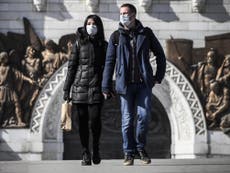The Independent's journalism is supported by our readers. When you purchase through links on our site, we may earn commission.
Trump's latest polling numbers show he isn't as invincible as he thinks he is
We need to stop believing the myth that the president always bounces back. The coronavirus pandemic tells a very different story

Covid-19 gave Donald Trump an approval bump as the public rallied around the flag. But that bump is now over. And its evaporation demonstrates one of the great truths of Trump's presidency: people don't like him. He has always been very unpopular, and looks likely to remain so through November 2020.
Trump's popularity hit its highest point since the very beginning of his presidency in early April, according to 538's poll tracker. That was when the health and economic effects of the virus were becoming painfully clear, and people wanted to express unity against the threat. Trump's approval hit 45.8 per cent at that time, and his disapproval dropped below 50, to 49.9 per cent.
Those are good numbers for Trump. But they're anemic compared to other “rally around the flag” effects historically. George W. Bush, for example, hit 90 per cent approval following 9/11; Jimmy Carter got up to 58 per cent at the beginning of the Iran hostage crisis.
Trump is also doing poorly compared to other leaders during the coronavirus pandemic. Governor Phil Murphy of New Jersey has gotten a major bump, going from 41 per cent approval to 71 per cent; Governor Gretchen Whitmer of Michigan has a lower but still impressive approval of 57 per cent. Chancellor Angela Merkel, Germany's leader, went from 35 per cent approval to 65 per cent during the pandemic, and Prime Minister Giuseppe Conte of Italy went from 39 per cent approval in February to 54 per cent by the end of March.
Trump's numbers, meanwhile, have already fallen back to where they were before the crisis began. His approval on April 27 was 43.3 per cent and his disapproval was 52.6 per cent — just about the same as March 22, when his bump started.
Why has Trump's rally been small and short? It may be in part because his public statements about the pandemic have been so confused and unhelpful. Trump rarely expresses sympathy for those who have lost loved ones in the pandemic, instead using his frequent press conferences to boast about himself or yell at reporters. His public health advice is transparently ignorant, terrible and dangerous; he essentially recommended that people inject bleach to fight the virus last week. He has done his best to run through people's goodwill as quickly as possible.
But that’s also a story which is true of Trump generally, much as his detractors may deny it. His post-inauguration honeymoon bump dissipated almost instantly, and he's spent the bulk of his presidency between 38 and 43 per cent approval — dismal numbers, especially considering that till now there's been no recession during his tenure. He's generally been dead last in approval compared to all other presidents at comparable points in their terms.
Trump has stubbornly lousy approval ratings for all the reasons that you'd think he'd have stubbornly lousy approval ratings. He's bad at his job, and continually says or does incendiary and horrible things designed to alienate large portions of the electorate. He vacillated when asked to unequivocally condemn fascists after they rallied in Charlottesville in 2017. He urged China to interfere in the 2020 US election on national television. He separated children from their families and put them in cages as part of his immigration policy. He and the Republican Party have continually tried to strip Americans of their healthcare.
After each outrage, pundits on right, left and center claim that Trump is unharmed, and that he can get away with anything. And to some degree it's true; Trump is still in office. He was not removed from office despite being impeached on clear evidence of obstruction of justice and election tampering.
But in other respects, it's not true at all. Trump's party has done very poorly in elections since his ascension to power. The Republicans lost the House in a landslide in 2018. They even, incredibly, lost an Alabama Senate seat in a 2017 special election. They lost a governor's race in Kansas. They've been routed in Virginia. It's true that the party with the presidency tends to do poorly in downballot races, but even so, voters — especially suburban voters — are fleeing Trump and his allies with impressive velocity.
Trump is doing poorly in the run-up to November as well. Biden's been 6 to 10 points ahead in national polling and the swing state polls don’t look great for the president, either.
Despite this, Trump could still win a second term. Republicans continue to support him, and the election is still a ways away: polls could change.
But no matter what happens, it's important to remember that people really dislike Donald J Trump. A majority of Americans have disapproved of his performance on virtually every day of his presidency. Even in a national crisis, when people did their level best to like him more, they soon found they couldn't.
Trump supporters try to convince themselves and others that they are an irresistible majority, and that nothing Trump does is wrong or unpopular. But the truth is that Trump opponents are in the majority. Trump is unpopular, and so is the cruelty, racism, callousness, and authoritarianism that have defined his presidency. That doesn't ensure victory in November. But we shouldn't forget it, either.






Join our commenting forum
Join thought-provoking conversations, follow other Independent readers and see their replies